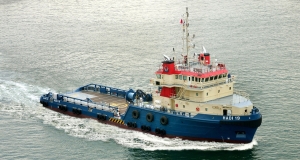Sailors abandoned by the operator. Are the shipowner and the maritime administration morally bankrupt?

 By Marek Grzybowski
By Marek Grzybowski
Seafarers on many ships are struggling to survive after being abandoned by the Saudi company Hadi H Al Hamman Establishment. The ITF has received numerous disturbing reports of the withholding of payments to seafarers working on eight ships belonging to the Hadi H Al Hamman Establishment. The company is registered in Bahrain, which has not ratified the MLC, warns the International Transport Workers’ Federation (ITF).
In some cases, the company failed to pay seafarers for more than five months. One of the sailors reported dangerously low levels of food, water and fuel on a tugboat abandoned by the shipowner.
– So far I have not received any salary [for 5 months] and I would like to inform you that we still have shortages of food and fuel, we are suffering all the time… Please, I need your support – quotes the ITF sailor.
The ITF fears an escalation of the problem and, assuming that the situation could repeat itself on 35 of the company’s ships, has added the Hadi H Al Hamman Establishment to the Seafarers’ Rights Violations Index. This is a new type of index that includes operators who deny seafarers labor rights, avoid settling obligations, violate fundamental human rights and the rights of seafarers’ trade unions to act in their interests.
A sailor under stress
A sailor’s slingshot is still not safe, also due to the unreliability of some shipowners. Bad social conditions, failure to respect workers’ rights and delays in paying wages are practices that the ITF, which is a federation of 670 seafarers’ trade unions operating in 140 countries, continues to raise alarms about.
The ITF contacted Gard, which provides financial security in such situations. In the event of abandonment of seafarers by the operator, it is possible to use the insurance and pay the seafarers lost wages (up to four months). Insurance also helps cover the costs of returning home. The ITF notes that “seafarers often go without pay while the dispute [over pay – MoE] remains unresolved.”
– Gard [in 2018 – MG] took the opportunity to interview a number of seafarers about the stressors in their lives on board a ship. It is no wonder that the fear of non-payment of wages is a major stressor, said Alice Amundsen, director of Gard’s People Claims since March 2016 with 25 years of experience in the Gard.
– A seafarer may be the main breadwinner in the family, so the consequences of non-payment or delay in payments may be serious – emphasizes the social consequences of the shipowner’s unethical actions. Jacqueline Smith, ITF Maritime Coordinator, who, after working at sea, was the head of the Norwegian Seamen’s Association for eight years.
Both women emphasized during the conversation posted on Gard’s website that “Stress not only affects the seafarer’s health, but also threatens the safety of the ship’s operations. To ensure social security, the ITF Seafarers’ Fund was established. Smith Explains that “It focuses on promoting and improving the well-being of maritime workers around the world. One of the key areas of focus is health and safety on board ships, including stress management and reduction.”

Crews of 35 ships at risk
The ITF fears an escalation of the problem on the company’s 35 ships and has added shipowner Hadi H Al Hamman to the Seafarers’ Rights Violations Index, a new index that lists entities that deny and abuse seafarers’ fundamental human rights and trade union rights.
“With so many ships from the same company, it seems likely that owners are experiencing financial difficulties,” said Steve Trowsdale, ITF Inspectorate Coordinator.
– It is unacceptable for [ship operator – MG] managers to use seafarers’ remuneration to juggle spreadsheets. They are playing with the lives of people, not only the seafarers themselves, but also their families, whose earnings depend on their salaries – emphasizes the ITF in a statement.
The ITF condemns the practice of capping wages as a way of managing shipping’s finances. Trowsdale points out that under international law – the Maritime Labor Convention 2006, as amended – seafarers should be paid at least once a month. Crews are considered abandoned if the shipowner is in arrears with remuneration for at least two months. This qualification is also accepted when the operator does not provide the crew with enough food, water and fuel. Trowsdale points out that such a situation should result in action being taken by insurers and the ship’s flag state (the country in which the ship is registered).
Bahrain’s passivity
“If you don’t pay your crews, you’re already bankrupt, both financially and morally,” Trowsdale said.
Most of the Hadi H Al Hamman establishment’s vessels are registered in Bahrain, a country that has not ratified the Maritime Labor Convention. Although ITF inspectors informed Bahraini maritime authorities of each case of ship crew abandonment, no practical action was taken to hold the owners accountable.
– Bahrain is responsible for the ships it registers, including wages, general working conditions and crew welfare. They have the power to hold the company accountable, and yet they did nothing to help seafarers, said Mohamed Arrachedi, coordinator of the ITF Flags of Convenience Network for the Arab world and Iran.
The ITF states in a statement that “It is a manifestation of Bahrain’s contempt for workers’ rights as it is one of the countries that has not ratified the MLC Convention.” Failure to ratify the MLC means seafarers aboard Bahrain-registered ships will be deprived of the fundamental legal protections of the convention known as the Seafarers’ Bill of Rights.
Arrachedi explains that if Hadi H Al Hamman does not immediately fulfill its obligations under the seafarer contracts, “the ITF will seek to activate a financial safeguard covering the crews, where such a safeguard exists.”
The crew under a leaky umbrella
Financial security applies to ships and shipowners who operate in accordance with the MLC Convention. But even Bahrain-registered ships often carry insurance, which may be required when visiting ports in countries that have ratified the convention.
ITF sends message to other seafarers: “We would like to hear from any seafarer who has not yet had contact with the ITF on board HADI 22, 23, 24, 26, 27, 33, 35, 38, 44, 46, 47, 48, 49 , 50, 51 or 54, or who has a salary problem on Hadi Al Hamman ships or subsidiaries.”
The situation is at least strange, because the shipowner is constantly investing in new vessels and is perceived as a solid company. The operator informs about itself that “Hadi H Al Hammam Group (HHG) is a leading provider of commercial, contract and maritime services based in Saudi Arabia, with operations throughout the Middle East.”
The company employs over 2,000 people in total. people of different nationalities. HHG has been operating on the maritime market since 1978. So it has long experience in managing ships and crews. The headquarters is in Rahima, with branches and representative offices located in Abqaiq, Safaniya (Tanajb), Riyad, Rabigh, Jeddah, Yanbu and Doha in Qatar.
The company serves operators providing services to the oil, petrochemical, gas and energy industries. HHG emphasizes that “With assets worth $300 million, it can undertake larger work in specific areas.”
HHG therefore operates on a market with good financial condition. The company’s offer is diversified. In 2018, HHG introduced several new modern units into operation. Does the lack of salary payments and the reduction in crew supplies mean that the ITF has detected a serious failure in an apparently well-functioning mechanism?
